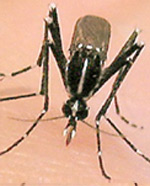DOH Investigates Dengue Fever on Oahu
By Wendy Osher
State health officials are investigating two confirmed, and two suspected cases of dengue fever on Oahu. All four adults, who became ill in late February, have since recovered.
Based on an ongoing investigation, officials with the Hawaii Department of Health (DOH) say the four cases appear to be related and were infected near their homes by mosquitoes.
“The Department of Health immediately began precautionary measures by conducting additional testing, surveying and developing a mosquito control plan for the specific areas where these four individuals were likely infected,” said Interim Health Director Loretta Fuddy. “We need the public’s help to clean up mosquito breeding areas throughout Oahu by emptying all standing water, and checking gutters and other areas that collect water.”
A medical alert was sent to Oahu physicians earlier this week advising them to consider potential dengue infection in persons with compatible symptoms. Doctors were also advised to request appropriate laboratory testing, and report all suspected cases to the DOH.
Steps to protect against mosquito bites:
Oahu residents and visitors are being advised to protect themselves against mosquito bites by applying repellant containing DEET (20-30%) or picaridin to skin and clothing. Damaged windows and door screens should also be repaired to prevent mosquitoes from entering homes and enclosed areas. Wearing long sleeve clothing can also further protect the skin from potential mosquito bites.
What is Dengue?
Dengue fever is a viral disease transmitted by the Aedes mosquito. It is primarily found in tropical and subtropical areas of the world.
The illness is characterized by sudden onset of high fever, severe headaches, joint and muscle pain, nausea, vomiting and rash.
Younger children tend to have a milder illness than older children and adults and may show no symptoms. Symptoms may last up to 10 days, but complete recovery can take 2-4 weeks.
Those with high fever in addition to any of the symptoms for dengue fever should see their doctor for evaluation.
How is Dengue transmitted?
Dengue is transmitted through mosquitoes which become infected by biting persons with fever and then pass on that infection by biting another person. It is important that infected people with fever stay indoors to ensure they are not bitten by mosquitoes and indirectly pass on the infection.
History of Dengue in Hawaii:
Hawaii experienced an outbreak of dengue fever in 2001 with the largest concentration of cases reported in East Maui. An extensive mosquito control effort to clear standing water and dispose of items that collect water was made. According to the Centers For Disease Control & Prevention, the outbreak spanned 8 months with the peak reported in September of 2001.
Since that time, there have been incidents reported in the state of imported cases. In 2008, the State Department of Health reported 14 imported cases; in 2009, there were 6 imported cases; and in 2010, health officials investigated 5 cases of dengue fever contracted outside of the state by travelers who became ill during their stay in Hawaii.
*** Supporting information courtesy Hawaii State Department of Health.











